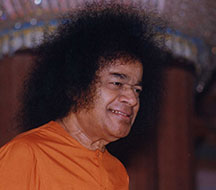
Faith in oneself leads to faith in God
Bangalore, Brindavan (Summer Course )
Description
Today in the world, we see many people who say that they have no faith in God. But, in fact, it is not possible to live even for a moment without faith in God. We should not be under the impression that God exists somewhere, having a special form, vested with special powers and so on. What is contained in your own heart as a clean thought and as supreme consciousness is itself God. He is God and you do not have to look for Him elsewhere. This sacred part of one’s heart is necessary for everyone. There is no one who does not have such a sacred heart. Because such a sacred heart is present in everyone, one can say that God is in everyone. He who does not have faith in himself will have no faith in God. There is no one who does not love himself, has no belief in himself and has no ambition to rise higher and higher. Even a man who does not have faith in God does have faith in himself and desires to have the strength by which to cultivate faith in himself. This is something which is quite natural and which comes surging from the depths of one’s heart. There is a small example for this.
Topics
-Faith
-
_1439794035.jpg)
If you follow Swami's command and lead life, HE will manifest in a second
00:04:46First and foremost one should have steady and intense faith in Vedanta. One can conduct oneself properly only when one has such faith. Swami will manifest in a moment to the one who follows Swami’s commands with unwavering faith, and continuous thinking. This is taught in the second part, the ‘Sankhya Yoga’. This segment deals with Sankhya, the numbers hence the name, ‘saankhya’. The five elements, the five senses, the five life breaths, and the five life sheaths- they make twenty in total. Mind, intellect, conscience, and ego- together they make a total of twenty four. Along with the vibration or life force they all make a total of twenty five in number. This segment is made up of these twenty five elements hence the name ‘Sankhyamu’. One must surrender them all to God. One must try to recognise these factors in Vedanta. Vedanta is very easy. One only gets confused because one does not know it. One might even get depressed. The confusion and depression together will lead on to a total loss of fuse. Once it is known Vedanta is very easy. It takes some effort to crush a rose petal, but to follow Vedanta is easier and simpler than crushing a petal. It might be a difficult task to churn the butter but following Vedanta is much easier than churning the butter. Butter is very soft. Students must know this clearly. The butter is very soft but heat is required to melt it. God, too, is very soft; soft and sweet. But if one wants to experience God, one must expose oneself to fire of wisdom. It is only when the butter is exposed to heat that the soft butter melts. This was taken as an ideal by the Vanaprastha of yester years. One day the wife put three rocks together and put a vessel filled with rice and water to cook on the three rocks. She then lit the fire. The husband, who was incessantly immersed in the thought of Brahman, took this scenario as the one depicting the principle of Brahman. The three rocks were likened to the three gunas, qualities namely the ‘Sathwa’, ‘Rajas’ and ‘Tamo’. The vessel was likened to the body. The water in the vessel represented the water of love. The rice in the pot represented one’s desires. The fire, on which the vessel is placed, is likened to the fire of wisdom. Is the fire touching the rice directly? Why is the fire placed below? It is to cook the rice. But the fire does not reach the rice directly. The fire heats the vessel first. Then the water gets heated next. It is the hot water that heats the rice. Therefore, first and foremost the body must be exposed to ‘heat’. The word ‘near’ is used in this context. Then next is love.
-
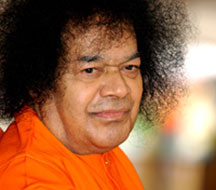
Krishna Asked Arjuna to pray during the war: Faith is pre-requisite for leading life
00:04:13Krishna told Arjuna, “Arjuna! You may be wondering about how to think of me in battlefield. But you pray to me and victory shall be yours. “Maa manas smaraichcha cha” you think of me and fight. Remember me even when you are fighting and I shall look after you.” One must have faith in those words- Bhagawan has said this to His students often. The war began on a new moon day. But on Chaturdasi (a day before new moon day), Arjuna was disheartened and sad as he made preparations for war. Arjuna, who pressurised Krishna saying, “Krishna you don’t go as emissary. We will prepare for war. Please don’t go for negotiations.”, was crestfallen on the day before the war. Krishna sought to teach him Geeta to drive away his sadness and fill him with enthusiasm and courage. This is the ‘Jnana bodha’ the teaching of wisdom. To teach Gita, Krishna wanted to know whether Arjuna had enough faith in His words. Krishna wanted to test Arjuna. Krishna was taking him along in a forest and it fell dark on the way. They turned to return home. Krishna started talking to Arjuna with an intention to change his mind. Krishna said, “See the peacock how beautiful it looks!!” Arjuna said, “Yes Swami, this peacock is very beautiful.” Krishna said, “O madcap, it is not a peacock. It is a big Garuda, an eagle.” Arjuna said,” Yes Swami, it is a Garuda.” Krishna then patted him on his back and said, “Madcap! You are unable to distinguish between a peacock and a Garuda an eagle. Look properly, it is neither a peacock nor an eagle, it is a pigeon.” Arjuna said, “Yes Swami, it is a pigeon.” Krishna said, “Are you out of your mind? Don’t you have the discrimination? What are you thinking? Don’t you know the difference between a peacock, an eagle and a pigeon?” Then Arjuna said, “Krishna! If I say that the bird is not a peacock, you may turn it into a peacock. If I say it is not an eagle, you may transform it into an eagle. If I say this not a pigeon you might turn it into a pigeon. You can change anything. What you say is most important to me and I am not bothered whether the bird is a peacock or a pigeon or an eagle.” Krishna was immensely happy on hearing Arjuna and was convinced that Arjuna had full faith in Him. Krishna pressed Arjuna’s head with force and said, “Now you are my devotee. Come, let’s go now.” Krishna decided to teach Geeta to Arjuna after he was convinced of Arjuna’s faith in Him and in His words. What is the use of teaching Geeta to a person who does not have faith?
-
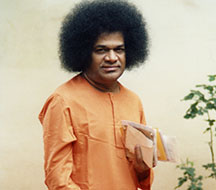
Without faith and love in God, whatever we do is useless: Analogy
00:02:48It is all useless if one does not have faith in God. People bring fresh vegetables; hire a good cook, get good quality pulses and salt, fresh stock of tamarind and a good vessel for cooking to prepare sambar. But due to some reason the sambar gets spoilt. The food prepared is not fit for eating. What is the reason? Was the tamarind not good? Were the pulses and salt defective? Or was the cooking vessel not good? No. The vessel was not tinned so the whole preparation was spoilt. Similarly when one engages in bhajans, chanting, penance etc without tinning the vessel called “heart’ with ‘love’, it becomes useless. This love must be there in the heart. Whatever one may engage in, it becomes null and void if there is no love in the heart. There is a tree that is resplendent with fruits and flowers. It looks very pleasing to the eye today. The next day it withers away. What is the reason? It is attacked by the root borer which is not seen externally. Similarly, though the tree of life is resplendent with health, wealth and peace , it withers and wastes away in no time when there is no grace of God and when attacked by the root borer called ‘bad habits’. Who are the enemies of life? Lust, anger, greed, attachment, pride and jealousy are the enemies of the tree of life. Lust destroys the action; anger destroys devotion, greed destroys knowledge. Therefore all the three paths of reaching God namely karma, upasana and Bhakthi are ruined and there is no use in living thereafter. One must either enter the karma (action) path or the path of upasana,(worship) or must immerse in the gnyaana (wisdom). Without these three, life is useless; one remains human only in form and not from within.
-
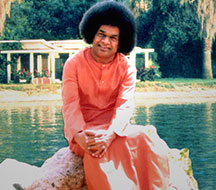
When God commands HE gets the work done: Story from Ramayana
00:01:16Rama asked Hanuman, “You must go in search of Sita. Go to Lanka and find out Sita and her whereabouts.” Hanuman doubted for a moment, “How will I cross this vast ocean? Lord is asking me to go.” He started chanting the name of Lord Rama. “The one giving the command will also give the capabilities to perform the task. This task has to be performed by me so He commanded me alone to do it. He, who has given the command, will also make the arrangements for its completion.” So thinking, Hanuman courageously went ahead. That is the steady and unwavering faith.
-
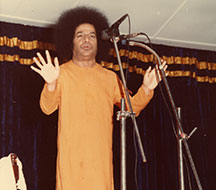
We need to repose faith in God: Story of Nana Saheb Chandorkar; A shirdi Baba Devotee
00:14:52One must have implicit faith in God’s words and conduct oneself in accordance with it. Then alone can man reach proper position. But man is unable to repose his faith in God’s words. At one time, Meena the daughter of Nana, a devotee in Shirdi, was suffering from labour pains. She was suffering the pains for three to four days and was totally tired. There was doubt about her very survival. There were no hospitals or facilities of nursing care a hundred years back. From time to time Nana would go to the picture of Shirdi Sai Baba and pray to him to protect his daughter. There is a connection between the devotee and the Lord where ever the devotee may be. The connection is just like the wireless connection. There may be a delay in relaying of message through wireless but this connection is much faster than that. The connection between the Lord and His devotee is that of heart to heart and love to love. The relation is heart to heart. This is true communication. Baba immediately came know the plight of His devotee. There was a person by name Rang Bhau in Shirdi. Baba called him and said, “Take this vibhuti and give it to Nana who is residing at Jamgam.” Bhau said, “I shall go Baba,” He looked into his pocket and found only two rupees. With that amount he figured that he could travel by train till Belgaum. He did not have enough money to reach Jamgam. He said, “Baba, I do not have enough money to travel. How can I go?” Baba said, “O mad cap, when I tell you to go, you go. I will make all required arrangements and take care of everything. Do not give any room to such doubts.” Same thing happened in the incarnation of Rama. Rama asked Hanuman, “You must go in search of Sita. Go to Lanka and find out Sita and her whereabouts.” Hanuman doubted for a moment, “How will I cross the vast ocean? Lord is asking me to go.” He started chanting the name of Lord Rama. “The one giving the command will also give the capabilities to perform the task. This task has to be performed by me so He commanded me alone to do it. He who has given the command will also make the arrangements for its completion.” So thinking Hanuman courageously went ahead. That is the steady and unwavering faith. Bhau too questioned Baba with a doubt, “I have just two rupees with me Baba, and how can I travel so far? I need to travel thirty three miles from Belgaum and how can I travel thirty three miles in Tonga, the horse driven carriage?” There were no cars or taxis in those days. The only means of transport was the Tonga. “I have to travel thirty miles in Tonga. And the driver will not allow me inside the Tonga if I don’t pay, then I will have to walk the distance. Can I walk thirty miles? Can I travel by Tonga?” As he doubted thus, Baba gave him courage by saying, “Have faith in my words. Follow my command. Go.” So without saying anything more Bhau started to Jamgam. He reached Belgaum at 1.30 am. “Where am I to go in this darkness? What should I do now?” So thinking he closed his eyes and started chanting Baba’s name. Suddenly there appeared a ‘billa jawan’, an attendant to the Tahsildar who wore a cross belt. A tall and hefty person wearing a turban and the cross belt appeared before Bhau. He started shouting, “Who has come here from Shirdi by train? O Bhau! O Bhau!” Bhau replied, “I am the one who has come from Shirdi on the order of Baba. I am Bhau.” The attendant said, “O come, come, the Tonga is waiting for you.” Bhau asked, “Where is the Tonga coming from?”The attendant replied, “Nana sahib has sent the Tonga.” It was a very fine Tonga. The horses that were drawing the Tonga were very powerful and beautiful to look at. Bhau sat in the Tonga. During the journey Bhau never felt the movement of the Tonga though it was moving at great speed and felt that the Tonga was gliding smoothly. Bhau thought to himself, “Even a car would not go at this speed. O! How great are these horses, which are going so smoothly!!” Thus he appreciated the Tonga and the horses. While he was musing thus the Tonga reached the village. The attendant said, “Look, there is Nana’s house.” Bhau got down from the Tonga and turned around to talk to the driver. But to his astonishment, he did not see the Tonga or the attendant. Bhau reached Nana’s home and said, “Nana sahib, here take this vibhuti that Baba has sent for you.” Nana asked, “When did he send?” Bhau said, “He did so yesterday evening. I reached the station at 1.30 am. But I don’t know how you came to know of it. I could reach here so fast because of the Tonga that you sent for me.” Nana was astonished. “I do not have a Tonga. I never sent anyone. I had no knowledge of your coming. Why are you talking so? Come show me the Tonga that you arrived in.” Bhau said, “The moment I got down from the Tonga I could not see the Tonga or its driver! The attendant told me that you had sent the Tonga along with the driver.” Nana said, “Let us not waste time in discussion. The patient is important. Let me give the vibhuti to her first.”So saying Nana went inside and gave the vibhuti to his daughter. Then he stood before the picture of Baba and prayed to Him intensely. He shouted, “Baba, Baba!” As he was shouting, he could hear the crying of the baby. A son was born to Nana’s daughter. He was very happy. He turned to Bhau said, “Bhau, tell me the entire journey. What did Baba say? Who did He send? How did you come here?” Bhau said, “I came here with just two rupees. Baba made all the arrangements.” The lord does not forsake the ones who have faith in Him. Faith is important. “Nammakambu anedi rendu nayanambuleleni Andhulairi nedu avani yendu!” People are blind for they have lost the eyes of faith. Anything can be achieved if one starts the task with faith. Nana could enjoy such happiness because of his faith. On the third day Nana and Bhau came to Shirdi. Nana said, “Baba, how wonderful is your play, your teachings, and your acts! It is beyond description!” Similarly, the vanaras, monkeys and Gopikas too extolled the Lord. Nana had very good voice and used to sing very melodiously. So he prayed to Baba, “ Ninu kanugona galama!! Baba, ninu kanugona galama!! Anuvu kante ati sookshma roopudavu, Ghanamu kante athi ghananeeyudavu!! Iruvadi naalugu lakshajeevamula anyayambuneneda baayakundu vata Anuvu renuvu truna kashtamu modaluga akhandaroopudavai veluguduvata !! Ninu kanugona galama!! Ghanamagu dongalalo gaja dongavu!! Ninu kanugona galama!! Baba, ninu kanugona galama!! Baba, can we ever know and comprehend you?!! You are smaller than the atom, bigger than the biggest!! You who never forsake the twenty four lakhs of beings! You who exists in the infinitesimal to the mightiest!! Baba can we ever comprehend or understand you?!! Among the thieves you are a very big thief!! Can we know you?!! Baba you know everything, but you act as if you do not know anything. You are a thief, you steal the hearts!!” One must realise a secret here. People get angry when anyone addresses them as a big bandit. They will get angry and start an argument. On the other hand when God is addressed as a big thief as in “Bada chitachora brundavana sanchara!!” all join in chorus blissfully. That is the sweetness of the melody of music. One gets intoxicated and carried away by the music. One cannot describe the sweetness of words and song. A small example to illustrate this: God is called as “gana priya”, one who loves music. One can speak to the Lord by way of poems, words or songs. It is sheer sweetness when one sings to commune with the Lord. “O Rama! You are compassionate.”- These words do not melt the Lord. Saying, “O Rama, please protect me!!” by way of poems, too, will not draw His attention. But singing melodiously, “O Lord Rama, please protect me!!” will immediately draw His attention. Hence the Lord is called as “gana priya”. Nana started singing in front of the picture of Baba. Baba was immersed in the song and was nodding His head all the time. Baba too joined in the chorus. The music makes the singer to forget him and also makes the listeners dance in joy. Even God dances in joy. That is the power of music! Hence that is the reason why bhajans are highly valued when praying to God.
-
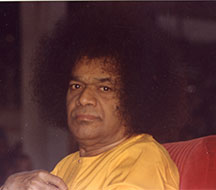
People trust in the words of soothsayers but not God
00:03:35"Nammaka chedina varalunnaru kani, Nammi chadinatti varu ee lokana leru leru!!" "People, who did not have faith, have failed, But there are none who had faith and failed!!" Man today has lost the eyes of faith. He reposes faith in everything where he is not supposed to. Man believes everyone but does not believe himself. When he does not have faith in himself, it implies that he does not have faith in God. The day, “Ekadasi”, is the eleventh day of the Hindu calendar. People believe the marking of Ekadasi in the calendar complied by some scholar and follow the ritual of fasting on that day. People believe and follow the calendar compiled by the scholar and observe the fasting ritual. If the day is stated as Sunday in the calendar one takes leave on that day and enjoys the leisure. Where from did one get this Sunday? Where did one get the Ekadasi from? How can one believe it? One believes the calendar written by a Siddanthi. Has the day dawned with the label “Sunday” on its face? Or has the day dawned with the label “today is Ekadasi”? The writing of a scholar is the basis for all this. People have full faith in the writing of a Siddanthi. The very Vedas declare, “Tat Twam Asi”- meaning “you are that, the Atma”; “Pragnyanam brahma”- “you are the awareness”, “ayamatma brahma”- “I am brahma”, “aham brahma asmi”- “I am brahma”. Why doesn’t man believe the declaration of the Vedas? This is the weakness of man. Man is unable to believe that which is the truth. He believes the imaginary and artificial things. That is the reason why man is subjected to all sorts of misery and sorrow. Man must have full faith in God’s word and put them into practice; then alone can man reach the proper position. But man is unable to put his faith in His words.
-
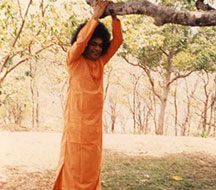
Purpose of worship is to have faith and love
00:02:00To shed off the bad qualities, one should develop selfless love. That is Devotion. Different modes of worship or meditation are not devotion. They are only steps to control your mind. To get on to the higher floor we use ladder. Ground is the support for that. The top of the ladder should lean to the top floor and only then the rungs of the ladder can be used to go up. The support of the ground is Faith and the top portion where the ladder leans is Love. With the help of these two we can go up and reach Bliss. Without these two we cannot even use the ladder. Our faith should be strong. Love should be sacred. If we can earn these two no need of doing any type of worship. What for these Japa and Dhyana? Worship is to attain faith and love and once these two are yours why worship? The thing you are searching for has come to your feet.
-

To receive god's grace faith and steadfastness are must
00:00:58Sincerity and faith are essential to deserve God’s grace. Faith forms the base at the bottom of the ladder. Love forms the top part. One cannot climb the ladder without the bottom and top rung. With faith and love one can achieve anything. One may be anywhere- in forest or in the sky, in a city or in a village, on a hill or in midst of ocean but God is in him, around him, above him and below him; God is everywhere. One must develop such divine thoughts.
-
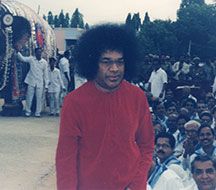
The true meaning of man is faith
00:01:33In Sanskrit and in Upanishads ‘Manava’ or human being means “the one who has faith”. Man means an entity with faith. But toady no man has this faith. Animals have trust in their master- a dog has full faith in its master. But man today does not trust his fellow men. He has no faith in them. A man who cannot trust his fellow men even for four days, how can he trust the Lord? Faith in fellow men helps develop faith in God. One may live for a short duration but must live with faith in God. One must develop ‘Shraddha’ or steadfastness to have such faith in the Lord. “Shraddha” steadfastness has two aspects viz: ‘interest’ and ‘stability’. When one has both, the interest and the stability, then one is bound to have steadfastness. One may have the interest of wanting God. One also needs stability of that interest. Then and only then can one attain divinity.
-
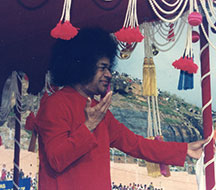
Human life is a waste without self-confidence and faith
00:00:54Man today has lost confidence in self and faith in God. It is for this reason that although the science of Allopathy has been progressing from time to time, diseases too are on the increase. What is the result of such progress? Therefore, every man must develop self confidence as it is the primal cause for everything. Without confidence in the self human life is a waste.
-
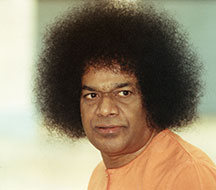
Develop faith and confidence
00:01:10“Where there is confidence there is love. Where there is love there is peace. Where there is peace there is truth. Where there is truth there is God.” Then is there any scope for hatred? Therefore one must develop confidence and faith. When one develops confidence one will have peace. So if one wants to be peaceful then one has to get rid of the hatred and develop faith. Embodiments of Love!! Vishwasa, faith is the true swasha, breath. Wicked and crooked thoughts are on an increase in today’s students, boys and girls. Hence one must take care that such bad thoughts do not enter one.
-
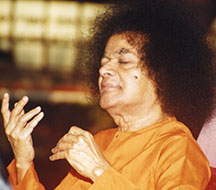
Have firm faith in God; Story of Matthew
00:01:47At one time, Matthew was the tax officer. He used to meet the fishermen to collect taxes. (He asked them,) "How have you developed faith in Jesus?" Doubting Thomases are multiplying in this age of Kali. They are full of doubts - doubts all through. We should never be in the company of doubting Thomases. When once you are in the company of a doubting Thomas you also become a doubting Thomas. You are coal. God is fire. Let the coal be near fire, the fire will get into the coal but the fire will never become coal. So be near God, you also will become fire - the divine. But we are mixing coal with coal. Your hands become dirty if you touch coal. Even if you wash coal with water, the water also will become dirty. You cannot clean coal in any way. With total faith in God alone can you clean it. If you want to have a pure mind you should have total faith. That faith will sustain divinity within you.
-
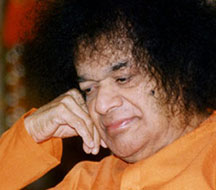
Mountain and Mist
00:00:14Truly if one has strong and unwavering faith in the Almighty, one will never suffer. Even if one has to suffer, the mountain sized troubles pass away as mist!!
-
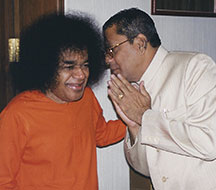
Having found the real Swami, hold firm
00:05:58Now, it is the unswerving faith, love and devotion towards ‘Sathya Sai’, amongst the members of the sevadal and amongst the Organisations that inspires them. Sometimes, an element of weakness enters these organisations as the leaders themselves get drawn towards other men, other God men or other great men and therefore, there are bumps and jumps in this spiritual progress. Ramakrishna Paramahamsa gave a beautiful story to illustrate this. A farmer wanted to dig a well for water in his field. While trying to dig the well at a spot, the farmer encountered a big rock at the depth of ten yards. On seeing the rock bed, the farmer left the spot to dig at another one for a well. In the second spot he encountered the rock bed at the depth of just five yards. He went to another spot and started digging again. He encountered yet another obstacle at the depth of three yards. He left this spot too and tried digging at another spot for water. After digging for just two yards he found a spring of water! He began to rejoice over the fact that he was able to get water by digging only to the depth of two yards. He felt happy at getting water at just two yards but did not consider the loss done to his field in the form of potholes at several places in the field. Instead of digging to a depth of ten yards, five yards, three and two yards at different places, had he persisted in digging at one spot to a depth of twenty yards, he would certainly have got a spring of water. Similarly you are unable to recognise the wastage of time and the hurt, despair, disgust and disappointment caused by running after this Baba and that Baba. At some places, some people claim that they are possessed by Baba and perform several acts which are wonderful and members, the leaders themselves are mislead by such acts and give propagation and publicity to such stunts. When you have Swami himself, the genuine Swami right in front of you, why do you care for the duplicates? Some organisations are in a state of utter confusion in some places because of this kind of behaviour.
-

Pre-requisite for faith is quality
00:00:42The self is within you. The self, the spirit is in everyone. The atma the spirit in everyone is one. It is not divided. They are all the sparks of divine. So, never measure in terms of age being young that he has got less of faith and being elder he has got more of faith etc. the faith and age are not related. The quality is one and the same irrespective of age, quantity might differ.
-
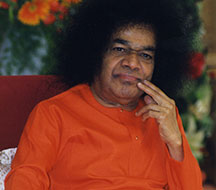
With courage, conviction and faith say, I have God in my heart
00:02:31Some may make fun of you. The atheists may argue, “Being well educated and a metropolitan bred you are entertaining bhajans etc like village people. This is not a sign of modernism. Do not think of God.” Then what should one think about, the Demon? No. One should think of God and have strong faith. “Sir, to whom are you sermonising, me? Whom are you denying? You are saying that God does not exist. You may not have a God, but I have my God. Who are you to refute my God? You are welcome to deny your God. I have my God and it is Him that I am thinking of.” When you retaliate thus, with full conviction and courage, your vigour and vitality are bound to improve. You need not listen to others or follow them, when they deny God. If anyone says that you do not have mother, you should not cry. The person saying so is a fool. You should tell them, “I have mother and she is at home.” Likewise, you must be able say with courage and conviction that you have God and He resides in your heart! You should make others follow you but not vice versa. If you follow others you become a slave. Others should become your slaves because you are with God. If you are with God, the whole world will follow you. Hence you must develop such faith, courage and conviction and should not cry over others words.
-
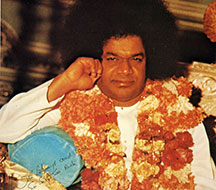
Say with confidence that I am going to see Swami
00:00:58They feel it a matter of shame to say that they are going to Tirupathi or Puttaparthi when asked by anyone as to where they are going; instead they say that they are going to Bangalore. What a weak person he is! Why lie for such a small issue? What is shameful in saying that you are going to Puttaparthi to see Swami”? With conviction and courage one must render service in society. With that spirit of courage one must go into the society to do any kind of service.
-
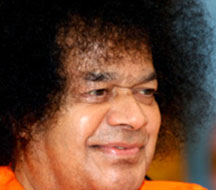
Man doesn't have faith in himself
00:01:50But man today has no faith. A person without vishwasa (faith) is verily without shwasa (breath). A faithless man is virtually a living corpse. Our ancient sages and seers therefore emphasised the need for faith. But man today has become virtually blind having lost his faith. What are the two eyes of man? The two eyes of man are shastra (scriptures) and dharma (righteousness). But today even the Brahmins who are supposed to study the scriptures are neglecting them. All sections of society, whichever caste or community they may belong to, should perform their duty with devotion and dedication. Instead of discharging his duty, man is wasting his life in mean pursuits. Consequently, he is unable to enjoy even a fraction of the unlimited peace and happiness he is endowed with.
-
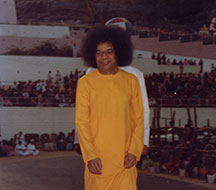
Faith in God is the basis for man's bliss
00:03:23Every man aspires for bliss. In order to attain everlasting bliss, he studies sacred texts, listens to the discourses of noble souls, undertakes pilgrimages and performs various spiritual practices like penance, meditation, etc. But none of these confers bliss on him. There are five sheaths in every human being, namely, annamaya kosha (food sheath), pranamaya kosha (life sheath), manomaya kosha (mental sheath), vijnanamaya kosha (wisdom sheath) and anandamaya kosha (bliss sheath). Though man has bliss sheath in him, he is unable to experience bliss. There is no trace of bliss in him. The happiness that man derives out of worldly comforts is limited. It is utter foolishness to think that wealth and property, comforts and conveniences can bestow unlimited joy on him. None of these can give true happiness. True happiness has no limits. How can it be attained? It cannot be attained from outside. It originates from the heart. The heart is the dwelling place of God. To experience true happiness, man should develop firm faith in God. Where there is faith, there is love. Only when man has love in him can he practice righteousness. Righteousness leads to truth which in turn leads to God. God alone is the source and basis of bliss. Truth is the basis of God. Righteousness is the basis of truth. Love is the basis of righteousness. Faith is the basis of love. But
-

Swami on Confidence and Faith
00:03:42The culture of Bharat lays much emphasis on three principles in the field of education. The first declaration is 'Sarvam Khalvidam Brahma'. One should have strong faith that God is all pervasive. First, we should achieve this confidence and faith. With this strong faith you will be able to achieve anything. Where there is confidence, there is love. Where there is love, there is truth. Where there is truth, there is peace. Where there is peace, there is bliss. Where there is bliss, there is God. So we begin with confidence. The result at the end is bliss. In order to be blissful, When we sow a seed in the ground, it germinates and sprouts. Then it becomes a tree and bears fruits. Likewise, the seed of human thought should be sown in the field of the heart. It germinates into a spiritual tree. It will have the flowers of happiness and peace and bear the fruit of peace. You all want to be peaceful but peace is not outside. You can attain peace out of confidence. Modern man has no confidence in himself. He just pretends in front of others. We have only acting in the field of devotion but not in reality, in daily life. Good and bad find their origin in you only. If you have steady mind you will have steady faith. With unsteady mind whatever you get is bound to be temporary. Students! You aspire to experience that permanent bliss. You should have strong steady faith. Modern minds have no steadiness in faith. They say 'I believe in God' and 'I love God'. They only declare but don't understand the spirit of love and the spirit of faith.
-
_1441086525.jpg)
God exists; Message to youth with analogies
00:10:39Young people generally do not have faith in God and they get into a despondent situation by asking themselves the question, is there God or no God? Even the first step of having faith in God is possible only for those who have done some good deeds in their past births. This reference to our past births is something which even the Indians are not able to believe today. There is a small example for this. As soon as a person begins his life, you find that he shows an aptitude to one particular avocation. Some people become poets. Some become singers, while some others become artists and so on. What is it that gives each individual this special ability. Is it not what he is carrying with him from his previous birth? You may argue that it is the effort that the individual puts in that is responsible for his becoming either a poet or a singer. This is not the case. You will have to think how, without any special training, these individuals are sometimes exhibiting such special skills. Among Indians, there is a belief that one reaps the fruits of his actions, there is a belief in rebirth and also a belief in carrying with us the good or bad we had done in our previous births. In modern times, people are asking questions regarding their connection with God. They ask why they should pray to God and have belief in Him. According to them, they can do anything they wish to do only with the help of modern science and technology. In this context, they question the need for thinking of God. Young people today argue and assert that it is a weakness to believe in God, whom they cannot see. While they regard any faith in God as a weakness because we cannot see Him with our physical eyes, they do not regard it a weakness to believe in so many other things, which we cannot see. Today, scientists are able to infer the presence of air by various aids, but are they able to see the air? While moving about in the sky and having faith in the sounds that we are uttering and hearing as symbolic of the sky, are we able to see the sky? When people talk about their minds and when they complain that their mind is wavering and is not peaceful, are they able to see their mind? When one says that his heart is very quiet or that it is very troubled, is one able to see his own heart? When you say that your head is aching, does this convey anything more than the head, and is there a shape for the pain which the head is suffering from? Thus there is no form for, and one cannot see things like happiness, sorrow, bliss, mind and so on. When you are having faith and belief in such things which have no physical form and which you cannot see directly, what is it that makes you disbelieve in something like God, whom you do not see? Thus when you talk of not having faith in someone or something that you do not see, is it not a weakness that you regard sorrow, mind, pleasure and so on as real, although you cannot see them. The world is made up of five elemental substances. These elements do not have a form. For example, air has no form. It takes the shape of the container. Similarly fire has no form and it has only a specific power. It can heat and it can burn. Therefore, these elements have qualities or attributes that you can only describe. They do not have specific forms which you can see. That special aspect which is above and beyond these five elemental substances is Divinity. Because we look at this creation with the help of the body which continually changes, the mind which continually wavers, and the vision which continually falters, we get all kinds of doubts.
-
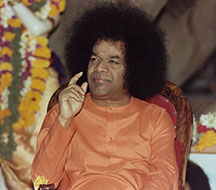
Faith can make you achieve anything
00:01:54Earnestness and faith are very important - the divine forms of Bhavani and Shankara. Therefore, let the whole world be happy. May the whole world be happy. What is the meaning of this? Earnestness and faith should be strong. If they are firmly established, there is nothing that you cannot achieve. You can achieve anything whatsoever. In a moment, we can attain liberation. We can experience bliss. There is absolutely no, literally no effort in this. Why do you give up ? Why do you give up this easy way and take upon yourself the burdensome ways of life? What are you gaining? The names which you chant only give temporary satisfaction. These are only symbols of the reality. What is our real name? It is Earnestness and Faith. My name is Sraddha. I have got faith. Without faith, there is no earnestness; without earnestness, there is no faith. The combination of these two is the atmic principle. Therefore, Atma principle is not anywhere else. It is within you, from top to toe. It is coursing through our veins in every cell of our body.
Topics
- Analogies
- Atma
- Attachment
- Balvikas
- Bhaja Govindam
- Bhajans
- Body
- Character
- Company
- Compassion
- Culture
- Day to day
- Desire
- Devotees
- Devotion
- Dharma
- Discipline
- Discrimination
- Doctors
- Education
- Festivals
- Forbearance
- Gayathri
- God
- Gratitude
- Guru
- Health and healthcare
- HIS Life
- Human values
- India
- Karma
- Love
- Mahabharata
- Man
- Meditation
- Mind
- Music
- Musicians
- Namasmarana
- Nature
- Parents
- Philosophical concepts
- Pleasure and Pain
- Practice
- Ramayana
- Religion
- Sacrifice
- Sadhana
- Sai Organization
- Saints
- Sathya
- Science
- Senses
- Service
- Sevadal
- Shanthi
- Shirdi Baba
- Society
- Spirituality
- Students
- Thoughts
- Time
- Unity
- Upanishad
- Vedas
- Vices
- Yoga
- Youth
